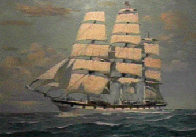

The Power in a Nation :a hypertext paper looking at the power dynamic in Moby-Dick, Ceremony, and Maus.
"...Ahab seemed no exception to most American whale captains, who, as a set, rather incline to the opinion that by rights the ship's cabin belonged to them; and that it is by courtesy alone that anybody else is, at any time, permitted there." (Moby-Dick 166)
The nature of sea life is that one person must have control of the vessel to coordinate the activities of the crew. The well-being of the whole ship insures the possibility of well-being for the crew. Deference to one power allows differences to exist, but the ship's well-being is the top priority. The crew must defer to the captain, but the captain's uncompromised power might keep him from seeing errors in his judgement. This unbridled power can make a cohesive strength or a dictatorial weakness which could destroy the whole venture. In Moby-Dick Captain Ahab had unprecedented power as he steered his crew on the road to disaster. He felt that like his captain cabin, that the will of the voyage was his total right.
Ahab's leadership pulls all the crew together, as America has been pulled together by the Caucasian, male power structure, but his vision is not the kind of vision to pull a crew to a higher plane. Just like a ship, a nation must be lead and tied together to effectively cooperate for the benefit of all the citizens. It is a difficult balance, however, to define national unity and cultural diversity. There must be cultural norms that tie together a nation, but do these standards detract from the diversity of the agregate? As on the Pequod, differences between groups allow the group with cultural or political dominance becomes the standard for the nation. The Native Americans of the United States and the Jews in Nazi Germany were dominated by a majority culture which would not or could not appreciate their differences. The majority culture has used certain mechanisms of power to extend the domination of the minority, whether or not the domination is intentional. The strength of these mechanisms has rested on whether or not the minority culture could work the system for their own benefit. Does the majority culture allow areas of gray where the minority is allowed to acclimate and have an outlet to power?
In Ahab's case, the strict leadership of the Pequod condemns the whole boat to death. Even though Starbuck tries to voice his reasonable doubts, the will of the powerful is too strong. It is necessary for the crew to follow the leader, who is supposed to be the authority on long term vision, but instead the complacency of the crew leads to the demise of the group. In cultural comparisons, at what point does individual culture enrich instead of detract from the strength of a nation? The environmental and spiritual beliefs of Native Americans are only now being seen as valuble to a rich and varied American legacy, and the economic and intellectual strength of the Jewish community in Nazi Germany was a vibrant national force before the doctrines of hate tore them down.
By Allison Tepley
American Literary Traditions, Professor Bass, Georgetown University.